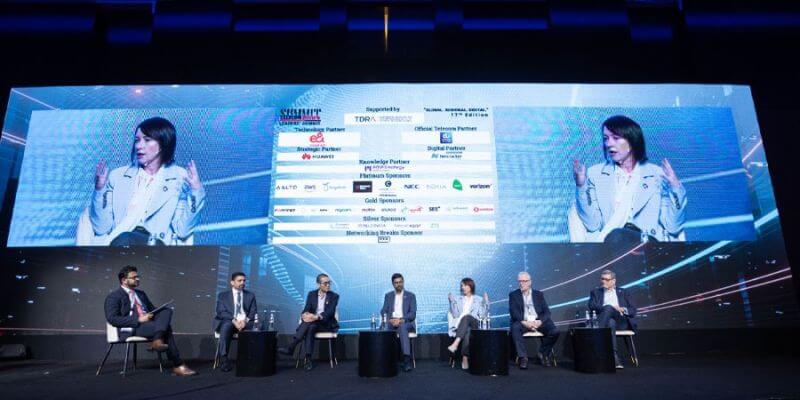The panel discussion featured an esteemed lineup of speakers, each bringing unique insights and expertise to the table:
- Emaad Ahmad — Principal Solution Consultant & Network Architecture Transformation Chief Expert, Huawei Carrier Business Group
- Anthony Darcy — Head of ESG Enablement and Communication, Nokia
- Harrison Lung — Group Chief Strategy Officer, e& Strategy
- Ibrahim Gedeon — CTO, Telus
- Ramy Moselhy — Chief Strategy Officer, SCIT Group
- Lidia Stępińska-Ustasiak— Public Affairs Advisor, Polish Chamber of Commerce for Electronics and Telecommunications
The panel’s moderator, Vivek Yadav, Managing Director Middle East, Financial Institutions, PMP Strategy launched the discussion, and the panelists explored several key topics surrounding sustainability and Greentech within the ICT sector.
These topics included the growing recognition of the adverse effects of ICT operations on the environment. The panel examined the factors that have contributed to the increasing focus on sustainability within the industry. It also delved into the intersection between sustainability and digital transformation. The panelists explored how organizations can leverage digital technologies to drive sustainability initiatives and achieve a more environmentally friendly future.
Addressing the Carbon Footprint
Ahmad mentioned that stakeholders must look at the whole picture and then examine the greatest impacts of decarbonization on companies. "95% of our carbon footprint is attributed to the products in use by our customers. So we are really making an impact. Efficiency is crucial. Certain laboratories are working with our supply chain as well, getting them to decarbonize in the production of components and materials."
Darcy added: "Nokia is a network equipment vendor; we're in 130 countries. We have to target our remote entrance as being 100% renewable by 2020. We exchange across those countries, including Egypt, where renewable energy is not available; so we have to come up with solutions. Working with the supply chain, facilities, and driving these initiatives is crucial. And then, really, focusing on simple things around the products. There are numerous aspects to consider on the product level."
Lung remained e& dedication to achieving net zero emissions throughout its entire value chain (comprising Scope 1, 2, and 3 emissions) by the year 2050. This involves reducing the Group's overall emissions in absolute terms and addressing any residual emissions through the implementation of top-tier carbon offset measures. "We have to target our remote entrance as being 100% renewable in the upcoming years.”
Gedeon emphasized the critical importance of collaborative efforts in addressing such issues. A keynote at CES this year stressed the need for increased creativity, and Gedeon urged everyone to actively contribute to being part of the solution. He emphasized the broader perspective of considering the ecosystem, emphasizing that the primary goal is to serve customers, not just in the present but in the long-term as well.
Pioneering Sustainable Power Sources
Moselhy stated, "Definitely something that hasn't been done, of course, is bringing sustainable power sources like our data centers into play. Most of these things just don't make any sense; even the way other solutions address these issues. Specifically, we can reduce carbon costs."
Stępińska-Ustasiak concurred with this notion, underscoring the significance of incorporating sustainable power sources into various operations, particularly in critical areas like data centers. She emphasized that adopting such practices goes beyond rhetoric and can have a substantial, positive impact on environmental sustainability. The integration of sustainable power sources aligns with a broader commitment to responsible and eco-friendly practices, reflecting an awareness of the importance of environmental considerations in operational decision-making.
The panelists underscored the significance of adopting green technologies to improve network performance, shedding light on the efficiency gains achievable through the integration of sustainable practices into the ICT infrastructure.
In their exploration of successful sustainability strategies, the panel delved into the essential components that organizations should consider; emphasizing factors like stakeholder engagement, transparency, and measurable targets as crucial elements for a robust sustainability strategy. Additionally, the discussion extended to the potential of 5G Advanced in driving sustainability and energy efficiency— where the panelists explored its transformative power and its capacity to enable innovative solutions, ultimately contributing to the reduction of energy consumption and carbon footprints in the ICT sector.










